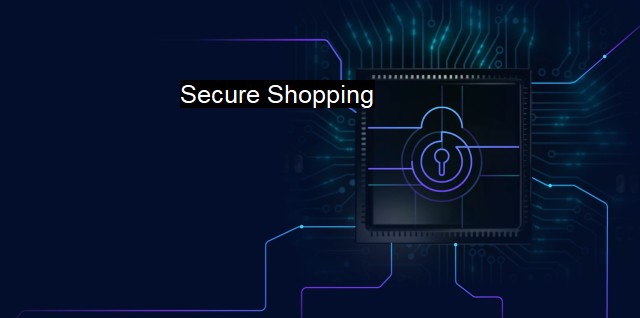What is Secure Shopping?
The Importance of Secure Shopping: Protecting Customers' Personal and Financial Information from Cyber Threats
As online shopping continues to rise in popularity, it has become increasingly important to ensure that customers' personal and financial information is kept safe from cyber criminals. This is where the concept of "secure shopping" comes into play - it is a term used to describe the measures that are put in place to protect online shoppers from fraud, identity theft, and other types of malicious activities.Secure shopping involves multiple layers of protection, including secure website design, encryption technology, and cybersecurity software. Let us delve deeper into these topics.
Firstly, secure website design refers to the use of industry-standard practices for creating secure web pages. Websites that are properly designed for secure shopping must use Secure Sockets Layer (SSL) encryption, which creates a secure connection between the user’s browser and the server hosting the website. SSL encryption ensures that sensitive data, like credit card numbers, remain between the user and the merchant and do not fall into third-party hands.
To ensure that a website or web page is composed of SSL, users should pay attention to the URL bar. If the URL for a site starts with "https" – as seen, on Amazon – it’s a sign that the site is utilizing SSL encryption. The “s” at the end of “http” signifies an SSL-encrypted connection and a relatively secure and safe way of passing information between sites and web browsers.
Secondly, encryption technology is a way of encoding data between two endpoints, preventing easy viewing or creation by unauthorized parties. To create a proper defense toward potential cyber adversaries, online retailers use encryption technologies in tandem with SSL certificates. This shields customers’ transactions by jumbling data so that they cannot be monitored by unauthorized watchers.
Encryption technology creates a shield that separates user data from the third-world entities of the web. Through this technological approach, online banking companies empower their online customers to conduct transactions online safely, eliminating any idea of being worried of identity theft, hacking, or the likes.
it is also important to have antivirus software installed and operational on any devices involved with online shopping. A virus means malicious programming that can disable or demand information from a user for a cybercriminal. Once cyber attackers can impose these set tactics, it creates more sophisticated, determined, and focused risks requiring a touch of synergy, connectivity plus higher commitment. Users should look to acquire software that employs virus-like definitions along with effective cyber threat tracking systems - malware blockers and piggy-bank watchmens are critical components of the security offerings systems.
Secure shopping is of the utmost importance for protecting online shoppers from fraud and other malicious activities, and it has become increasingly relevant as more people rely on e-commerce for their shopping needs. Online stores that prioritize secure shopping have a greater chance of building long-lasting customer relationships by establishing trust and proving their commitment to the well-being of the people whom they seek to serve.
From the perspective of business owners or online marketers, It is strongly advisable to utilize measures related to antivirus software packages for all internet-connected devices which can help protect against cyber risks such as identity theft and financial fraud alongside lost productivity, monitoring deficient service network zones.

Secure Shopping FAQs
What are the risks of shopping online without proper security measures?
Shopping online without proper security measures can make you vulnerable to cyber threats such as malware, phishing, and identity theft. Hackers can steal your personal and financial information, leaving you with unauthorized charges, compromised accounts, and a damaged credit score.What are the essential security measures that online shoppers should take?
Online shoppers should take essential security measures such as using antivirus software, keeping their devices and apps up-to-date, using strong passwords, enabling two-factor authentication, avoiding public Wi-Fi, and checking for secure websites with HTTPS and SSL certificates.How can I verify if an online store is secure and legit?
To verify if an online store is secure and legit, you should check for signs of trust, such as customer reviews, contact information, return policies, and secure payment options. You can also check for security indicators, such as HTTPS, SSL, padlock icon, and security seals from recognized organizations such as Norton or McAfee.What should I do if I suspect that my personal or financial information has been compromised during online shopping?
If you suspect that your personal or financial information has been compromised during online shopping, you should immediately contact your bank or credit card company to block any unauthorized charges and monitor your accounts for suspicious activity. You should also report the incident to the relevant authorities, such as the Federal Trade Commission, and consider getting identity theft protection services to prevent further damage.| | A | | | B | | | C | | | D | | | E | | | F | | | G | | | H | | | I | | | J | | | K | | | L | | | M | |
| | N | | | O | | | P | | | Q | | | R | | | S | | | T | | | U | | | V | | | W | | | X | | | Y | | | Z | |
| | 1 | | | 2 | | | 3 | | | 4 | | | 7 | | | 8 | | |||||||